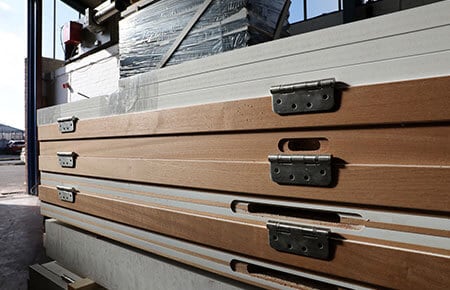At Vigor, we’re passionate about fire safety and saving lives with our high-quality fire door products.
So whenever there’s a law change concerning it, it’s our job not only to be informed but to inform others as well.
This article will give you a run down of the new Fire Safety Act 2021, which will make for very important reading if you’re a landlord, property owner, the person responsible for building fire safety or simply an occupant.

The Ins And Outs
The Fire Safety Act was introduced in March 2020 following the Grenfell Tower tragedy that occured in June 2017.
Made law on the 29th of April 2021, the bill is a relatively short piece of legislation that has a big significance for anyone involved in assessing or responsible for tackling fire safety risks.
The Act is applied in England and Wales, with other safety legislations in place in Scotland and Northern Ireland.
Amending the Regulatory Reform Order of 2005, the Fire Safety Act was intended to improve multi-occupancy domestic premises.
What does this mean?
It means the external walls and fire doors to individual flats must now be assessed when undertaking a fire risk assessment.
Who undertakes these assessments, you ask?
The Act requires the owners and managers of the buildings, coined ‘responsible persons’, to ensure that the risk assessments aren’t just completed, but regularly updated to include the structure, external walls and flat entrance doors.
It also enables the Fire Service to take enforcement action against ‘responsible persons’ who fail to comply, as well as allowing the government to issue risk-based guidance which can be referred to as proof that a ‘responsible person’ has ever succeeded or failed to comply with the requirements of the Fire Safety Act.
So, if you’re a landlord or owner of a multi-occupant building, it’s time to step up.
The Act combines the recommendations made by Sir Martin Moore-Bick in his report of the Grenfell Tower inquiry and the thoughts of Dame Judith Hackett’s review of Building Regulation and Fire Safety.
Though passed, it’s important to note that the Fire Safety Act will only come into force fully towards the end of 2021, or even the start of 2022.

Risks?
It is already evident that the Fire Safety Act will place more duties upon the ‘responsible persons’ for each building.
To put it plainly, risk assessments concerning fire safety have been significantly extended, and ‘responsible people’ may potentially need to introduce additional safety measures and action to comply.
It is therefore highly recommended that building owners or managers begin to get up-to-date with fire risk assessments, ensuring that the requirements of the Act relating to the external structures (walls, windows, balconies) and flat entrance doors are included in the assessment.
Any responsible person who does not comply with the new laws and regulations will inevitably face the prospect of enforcement action, which could include criminal prosecution or a sizable fine.
Still a bit unsure about your responsibilities?
For a more in depth look at the Fire Safety Act and its provisions, check it out on the gov.uk website.
Implications For Insurers
The bill, without question, is a positive and long-awaited step in the right direction for improving both building and fire safety risks.
Insurers have called for fundamental reform for a while, due in the most part to the number of buildings that have been left with poor levels of fire protection.
An important point to consider, however, is the potential impact of the Act on the insurance market.

The changes brought into action by the Fire Safety Act should mean fewer insurance claims being made in relation to building or construction policies as a result of improved building safety and fire risk assessments.
Nevertheless, there will be increased responsibility on property owners, managers, developers, contractors and other construction professionals to comply.
While the measures to improve building safety are undoubtedly important and should lower the risk of loss and damage caused by fire, consideration will be given to the insurance market’s ability to provide adequate cover to duty holders.
Bad News For Leaseholders
The draft text for the Bill was initially presented to parliament in March 2020.
But, the COVID-19 pandemic aside, most of the delay stems from a dispute between the Government and House of Lords over whether the Act should include provisions on who should bear the costs of remediating combustible cladding.
It’s common knowledge that the combustible cladding (lightweight metal composite panels) on the external facade was one of the most significant factors in the Grenfell Tower disaster.
Since the fire, many multi-occupied, multi-storey residential buildings have had the cladding removed at considerable cost.

During the passing of the Act, the House of Lords attempted to add several amendments into the Act to prevent ‘responsible persons’ from seeking to recover costs of remediating cladding.
The House of Lords motions were defeated, meaning Leaseholders have no statutory protection under the Act against having to make big contributions towards the costs of remediating any non-compliant external walls.
The Future
If you’re reading this and you’re a duty holder, then the message is simple: follow developments closely.
You still have time before the Act comes into full force, but if you fail to react you could feel the full force of the law.
When all is said and done, the Fire Safety Act is a step in the right direction.
Concerned about fire safety in your property? Then speak to one of our expert team members.
We offer a broad range of fire doors and related products that will help you rest a little easier at night.
Get in touch today on 01642 265 034 or email info@vigordoors.com


